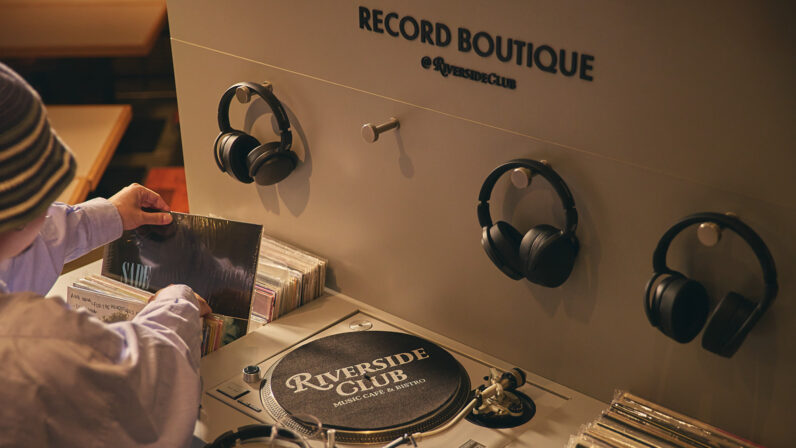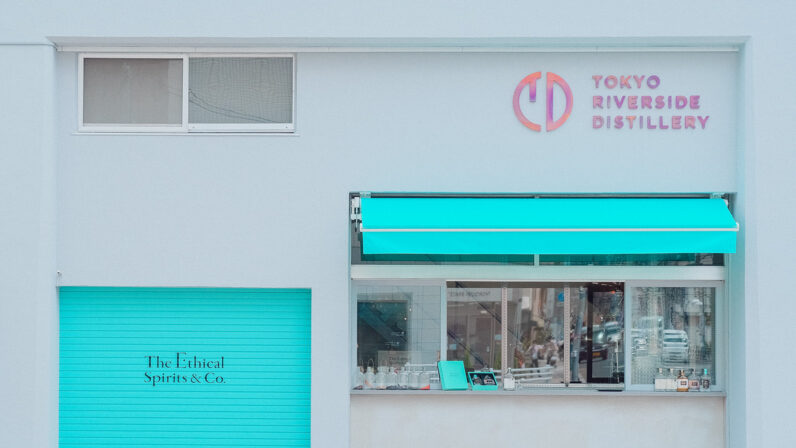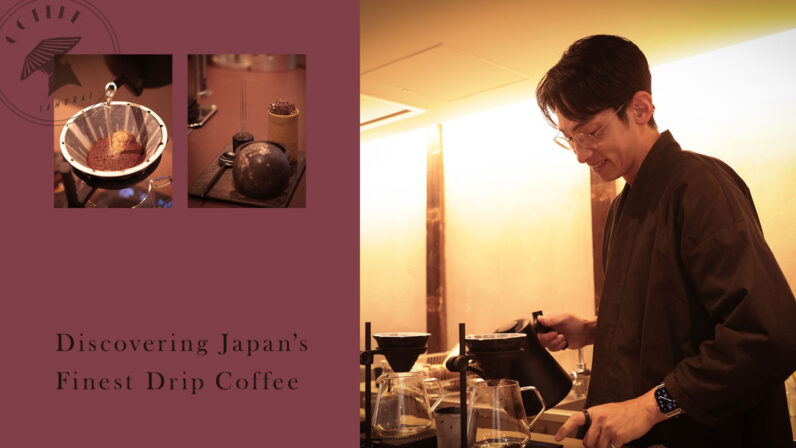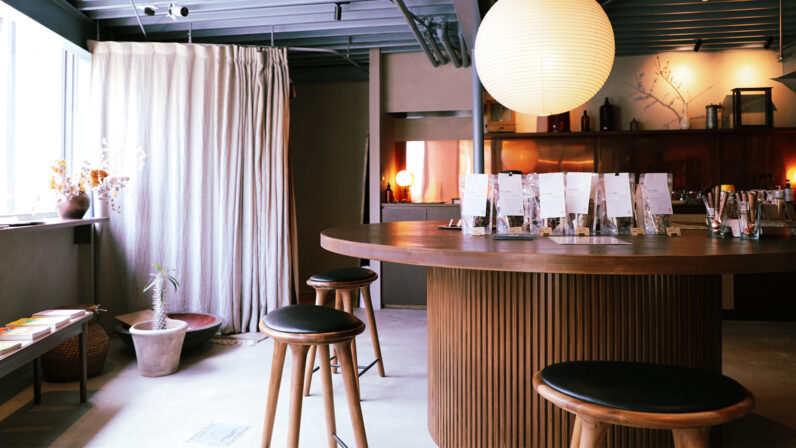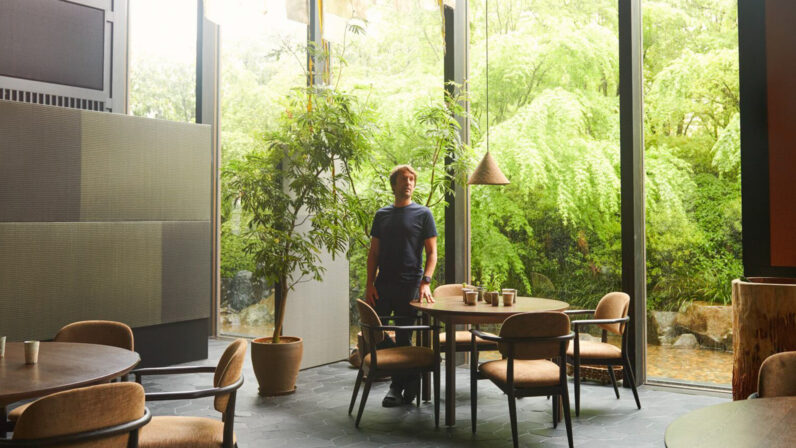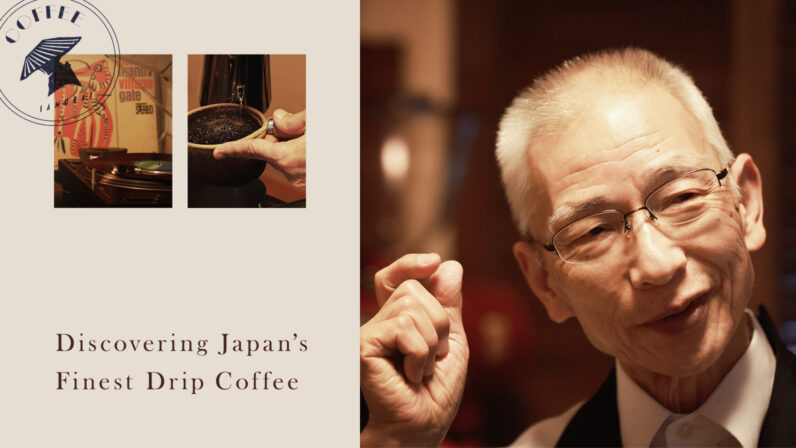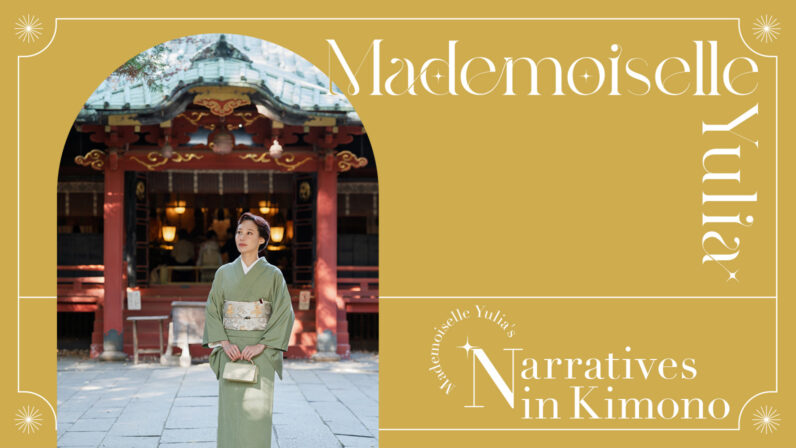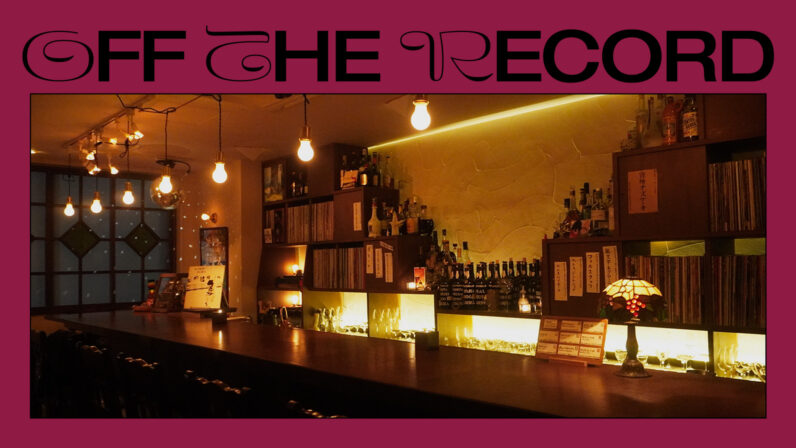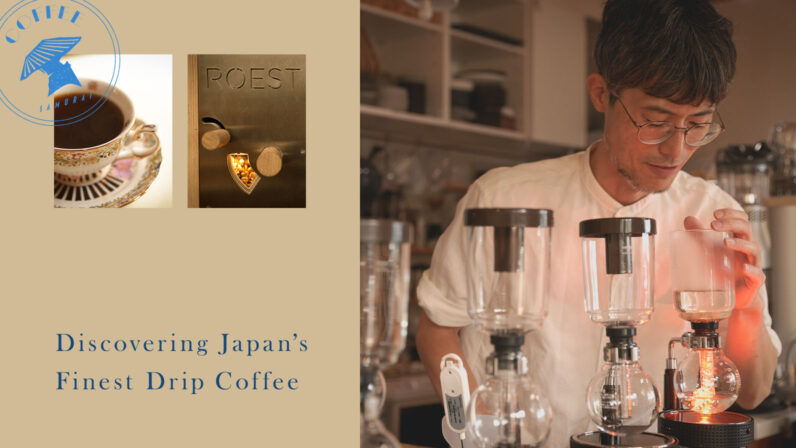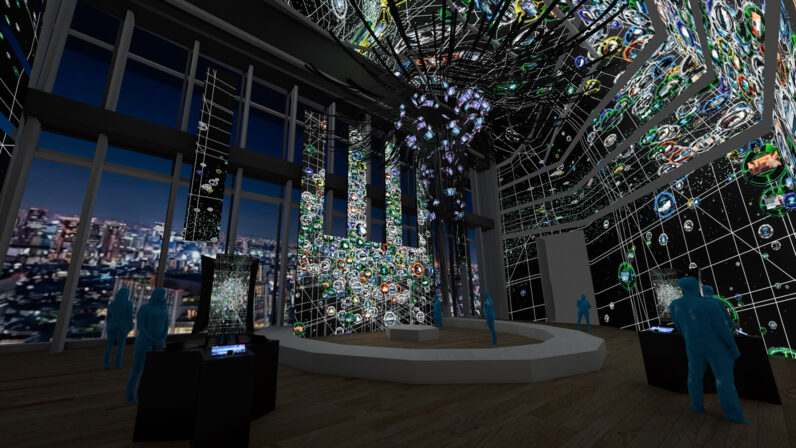In Japan, listening bars have become a distinct part of late-night culture, with origins dating back to the 1950s. Decades later, they continue to thrive, offering a haven for audiophiles and discerning drinkers. In OFF THE RECORD, we explore establishments where music and atmosphere are central to the experience, uncovering the stories, people, and sounds that define them. In our third edition, we visit BAR ahiru-sha, a hideaway in Kagurazaka, rich in nostalgic warmth, where the art of traditional bartending, vintage sounds, and understated hospitality come together.
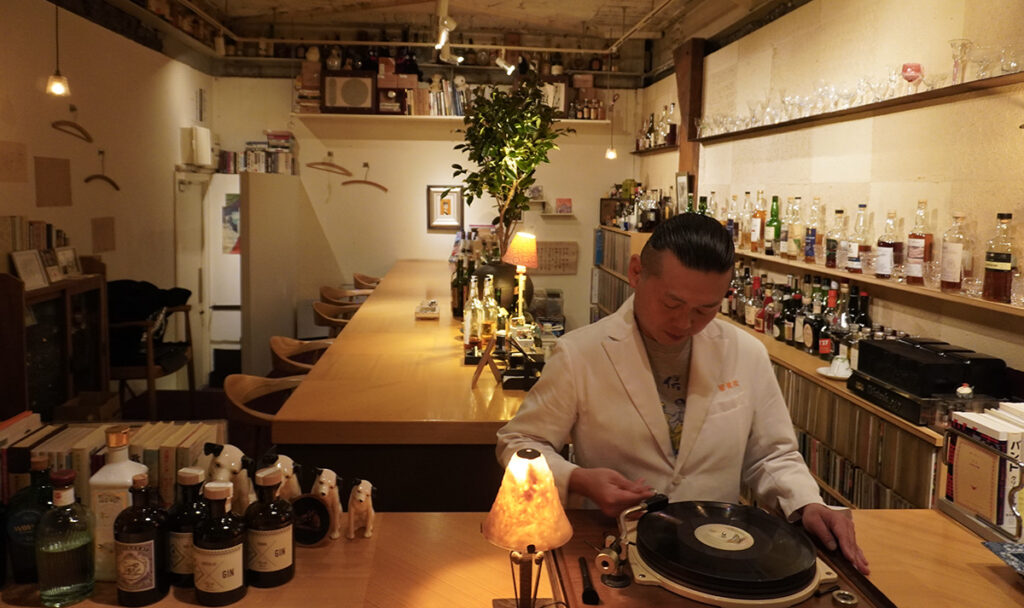
Kagurazaka, once a lively geisha district, now exhibits a unique blend of modern living and cultural heritage, with remnants of the past still visible. Along Kagurazaka-Dori, above a ramen shop, you’ll find BAR ahiru-sha, marked only by a subtle sign in the stairway of a modest building. Unassuming and easy to overlook, the bar is tucked away on the second floor. The warmly lit small bar offers an intimate space where time slows down. Here, visitors can feel at ease with their favorite drink, while reading a book or conversing late into the night.
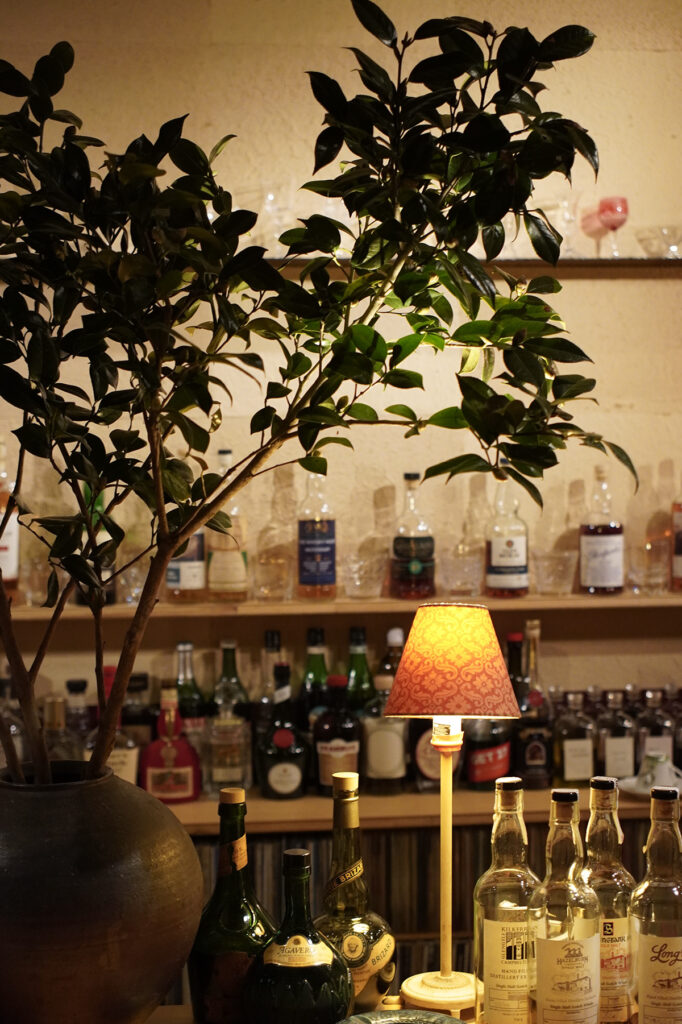
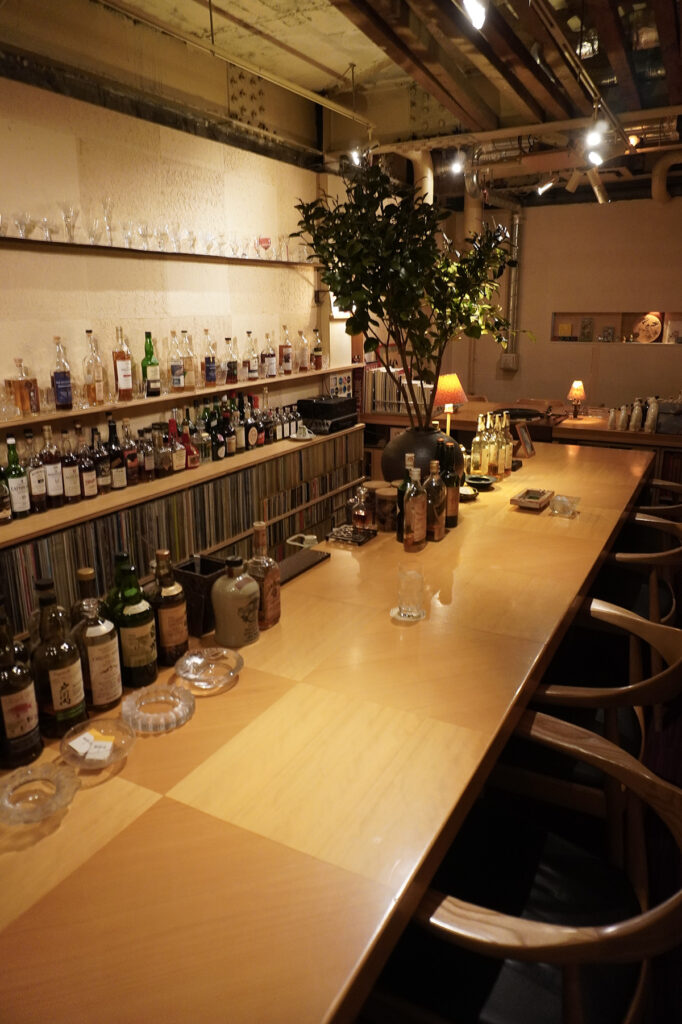
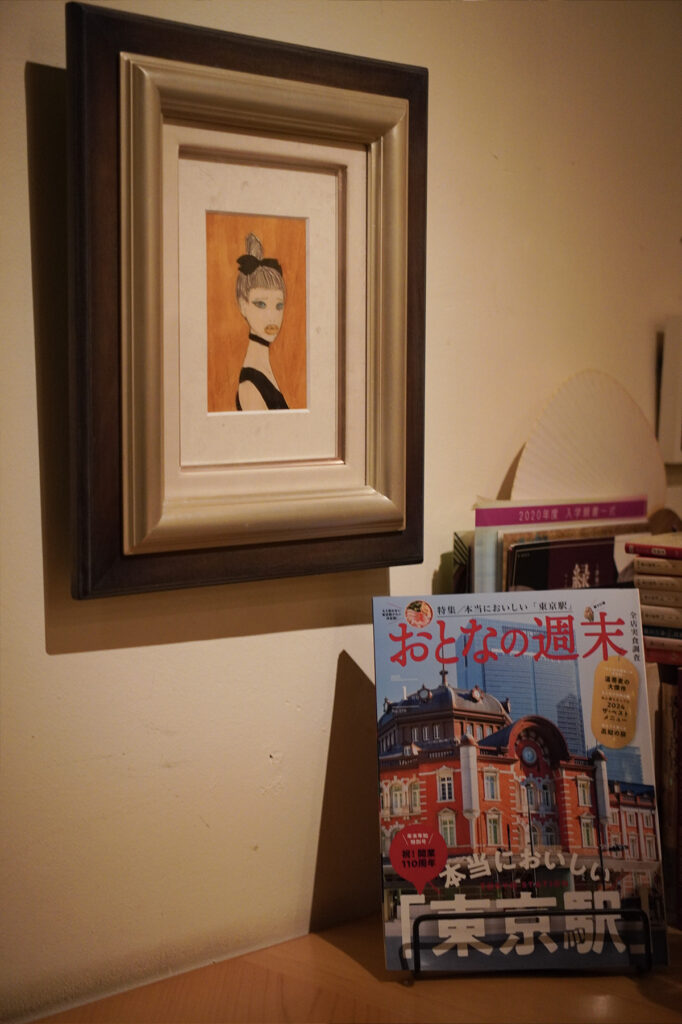
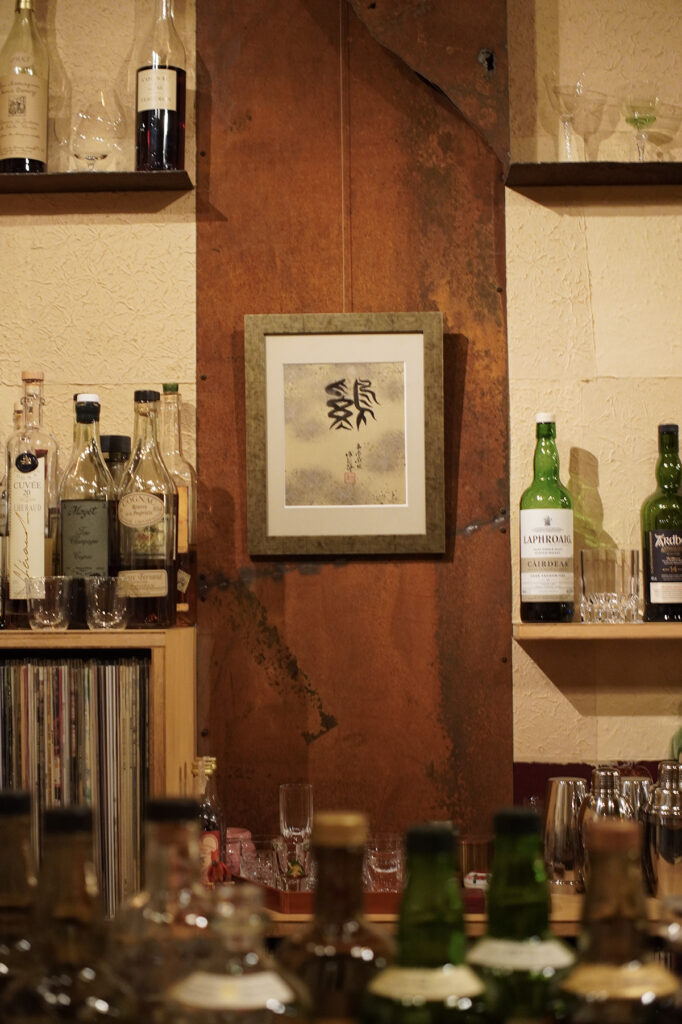
A glimpse from the entrance reveal a welcoming counter thoughtfully adorned with personal touches.
BAR ahiru-sha was founded by Shuhei Okamura, who moved to Tokyo at 18. At the time, pâtissiers were gaining prestige, and top chefs were becoming stars through shows like Iron Chef. “I’ve always loved food, so I admired pâtissiers. But I couldn’t afford the tuition for pastry school,” he says with a laugh. Instead, he decided to dive into a different scene, and worked at a variety of bars in neighborhoods like Ebisu, Ginza, and Shinjuku. Some bars were fine spirits establishments while others were more laid-back record bars.
With a wealth of experience, Shuhei opened BAR ahiru-sha in 2014. Combining his career experiences with personal possessions, he crafted a space that feels both intimate and distinctive. Every thoughtful detail, from the drinks to the ambiance, reflects his journey and philosophy. The bar is as much an extension of himself as it is a retreat for his guests.
Music for Every Moment
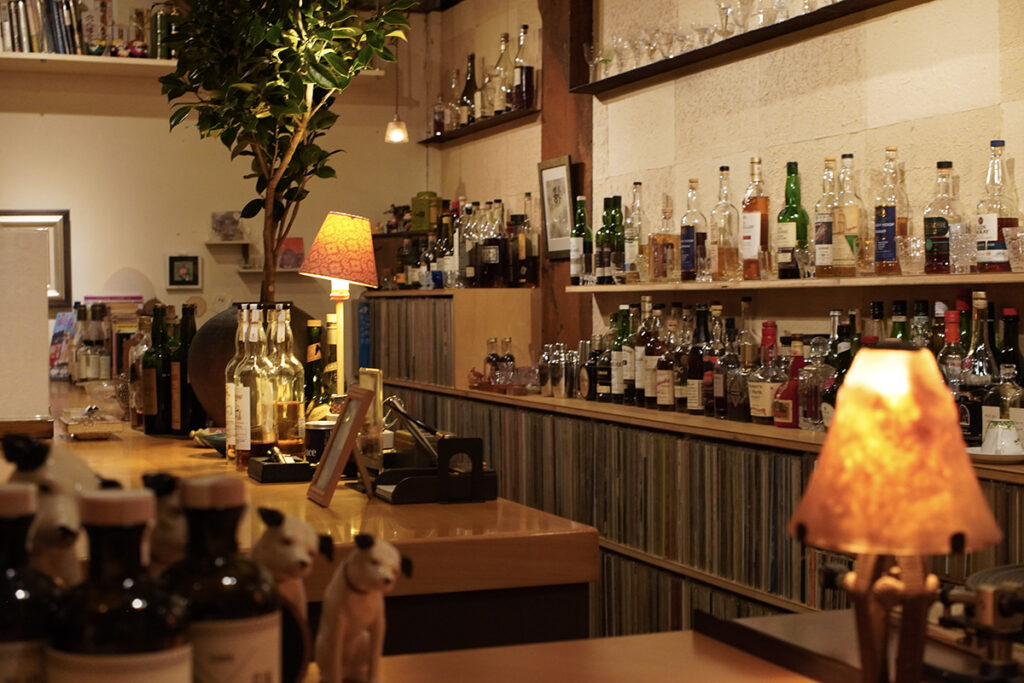
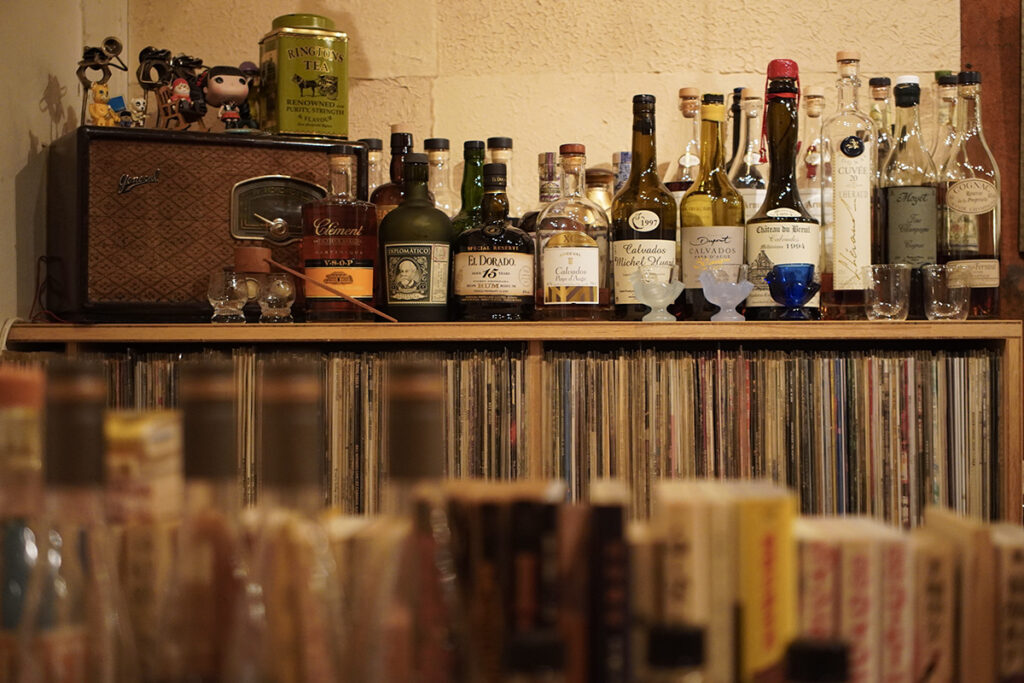
The bar’s impressive record collection spans the length of the counter, with approximately 3,000 vinyl records lining the shelves.
“I opened the bar about 11 years ago, back when vinyl records weren’t as trendy as they are now. But I had a personal collection, and I thought, why not play these during business hours? So, I brought them in,”
The collection reflects his love for music which started from an early age, and spans across genres from jazz to rock, soul, hip hop, J-pop, and more.
Careful thought goes into the selection of tracks each night. Playing similar genres back-to-back is avoided, creating an eclectic mix that caters to different moods and moments. You’ll also find gems like first pressings, rare limited editions, and some of Shuhei’s personal favorites.
“I like the idea that each record has a story behind it, whether it’s tied to its production, the artist, or the time period when it was made,” he says, a sentiment sure to resonate with music lovers and aficionados alike.
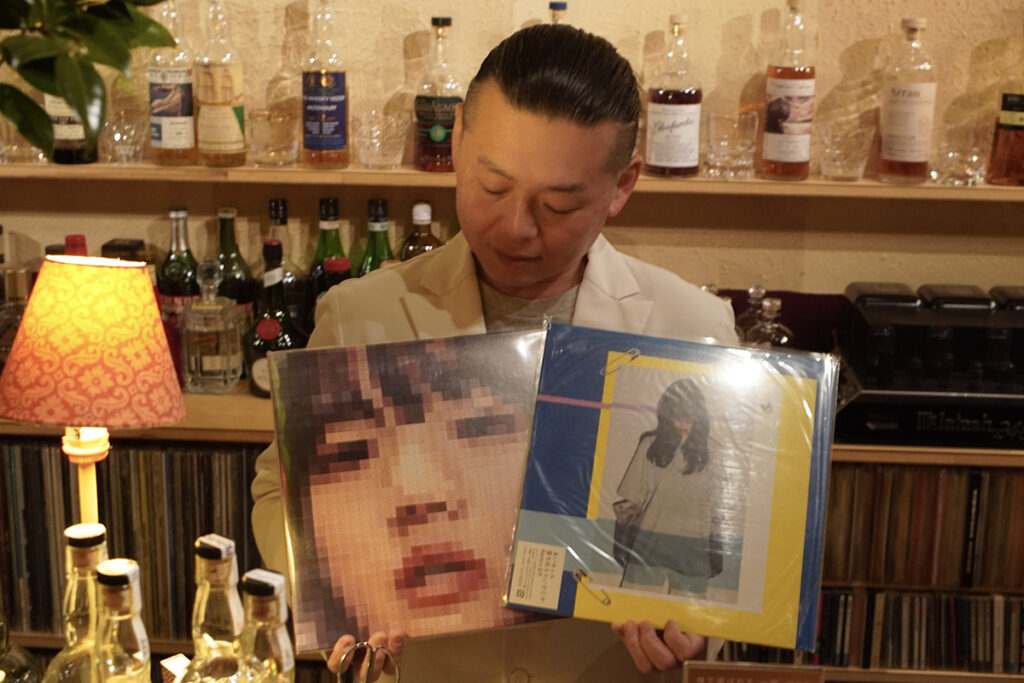
Showcasing recent favorites from Jpop singer-songwriter Aimyon, the album ‘Jealous of Cats’ and the ‘Ai wo Tsutaetai Datoka’ Remix EP. While discussing music he recalls his days glued to music programs as a child, and soaking up the music culture brimming in Shibuya when he first arrived in Tokyo.
Sounds from a Past Era
A key part of the ambiance is owed to the vintage sound system, which includes a Garrard 301 turntable from 1956, Jensen speakers from the late 60s, a Marantz 7 Preamp, and a McIntosh MC240 Amplifier. Shuhei explained that his choices were driven by a desire to use equipment from an era when vinyl records were the norm. Authenticity was important, but admiration for these legendary pieces and longevity also played a role. These models remain popular to this day, with replacement parts readily available, unlike niche equipment that can be difficult to repair. Commercial-grade gear was also key for handling the demands of running 10 or more hours a day.
The combination of sound quality, durability, and ease of use resulted in the current setup. With a variety of genres played through the evening, the warm, nostalgic quality of the vintage sound system ties everything together amazingly. As Shuhei curates the evening’s music, he carefully adjusts the sound balance “I focus on making sure the music volume doesn’t interfere with conversation. By keeping the bass levels lower, customers can speak normally without straining to hear each other. This isn’t a ‘sit silently and listen’ kind of bar.”
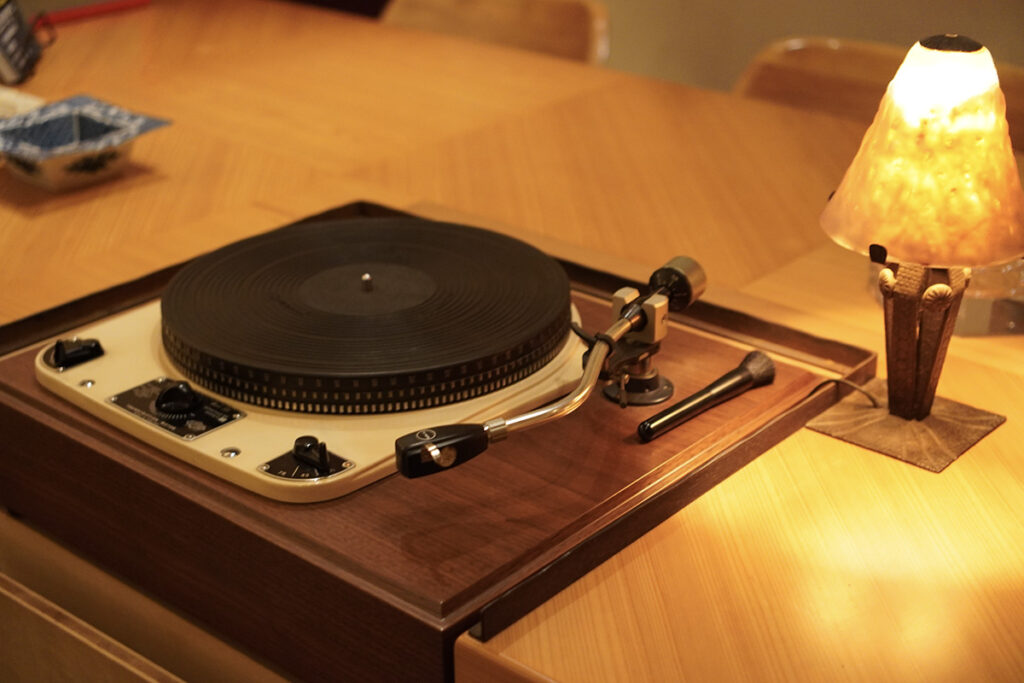
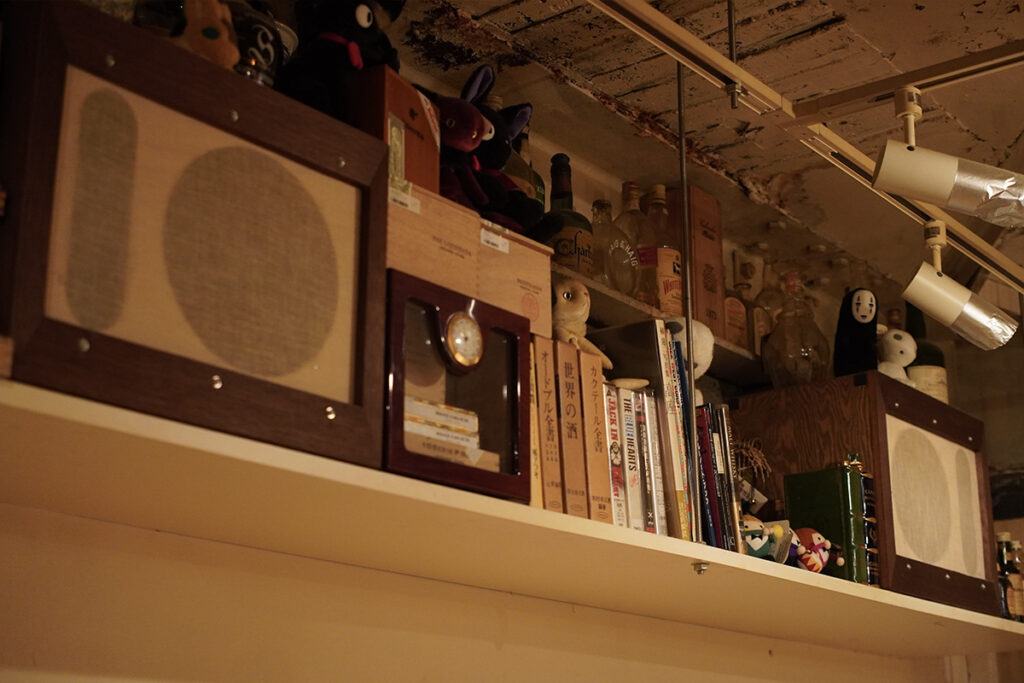
The Garrard 301 turntable from the 50s, known for its high-quality build and timeless design, paired with vintage Jensen speakers placed above the bar on the left for optimal acoustics. Tip: The seats in the back offer the finest audio experience.
Bartending Rooted in Tradition
In line with the sounds of BAR ahiru-sha, the drinks are kept authentic and classic. The shelves are stocked with spirits, liqueurs, aperitifs, and everything needed for the craft of bartending. There is no fixed menu; instead, customers can tap into Shuhei’s wealth of knowledge to match their preferences or the mood of the moment. For non-Japanese speakers, a small English menu is available, with classic cocktails categorized by glass type.
For first time visitors Shuhei recommends starting with a Gin & Tonic or Gin Rickey. He explains that these classics reflect a bartender’s approach to flavor and serve as a good starting point. From there, they can opt for sweeter, lighter or drier flavors, etc.
“This approach used to define Japanese bar culture, but recently, signature cocktails have become a major focus. Personally, I think every gin and tonic a bar serves is unique….Each bartender’s expertise and dedication go into making even standard cocktails, and that’s where the real joy lies.”
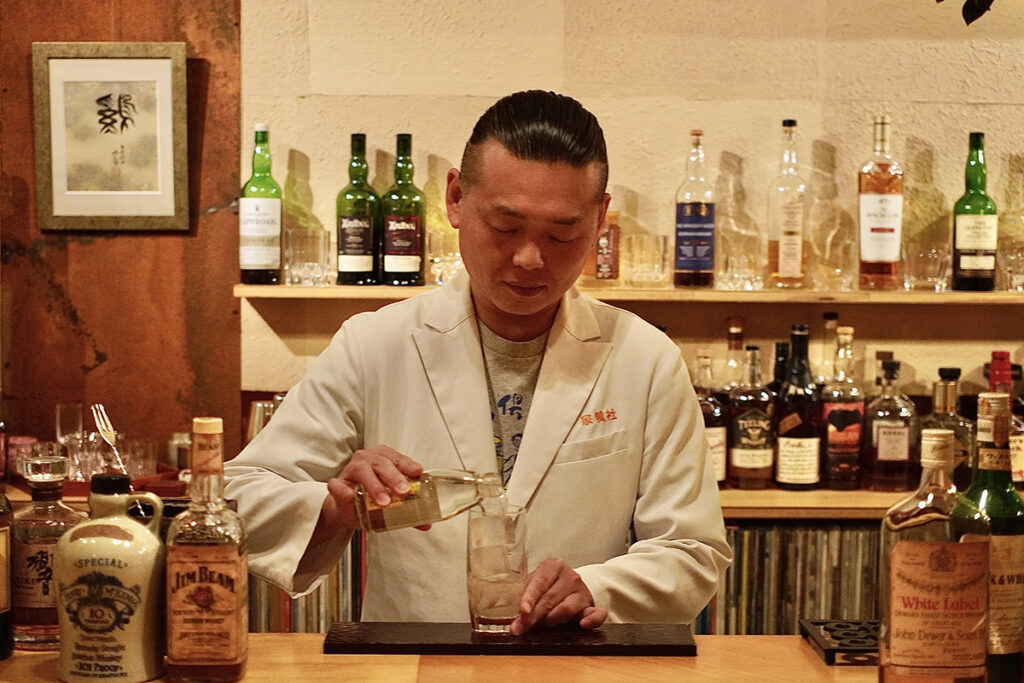
Preparing a classic Gin & Tonic before selecting the next record
Shuhei wears a customary white coat, which references a time when alcohol was akin to medicine. Inspiration is also drawn from the art of Japanese Tea Ceremony which he has practiced for the past 17 years. For him, preparing and presenting a drink gracefully while explaining it is very similar to the gestures in Tea Ceremony. His approach shows an appreciation for tradition and older ways; a contrast to the mixology-driven trends often seen in today’s bar scene.
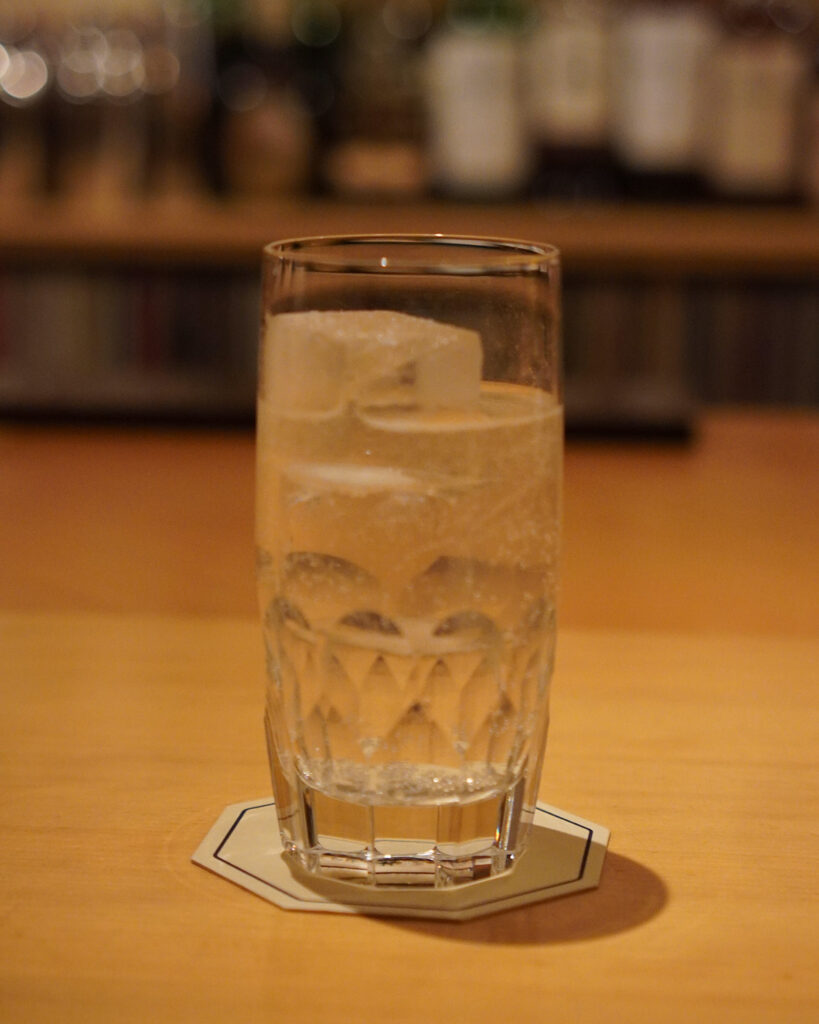
A classic Gin & Tonic, simple in presentation, yet encapsulating the fundamentals of the bar.
For the whiskey lovers, there is a wide selection, and as a collector himself, Shuhei has a number of treasures. Throughout the bar, you’ll find one-offs, like single-cask whiskeys from very limited production runs. The opportunity to savor some of these is truly ‘ichigo-ichie’ (a Japanese phrase meaning ‘a once-in-a-lifetime encounter’).
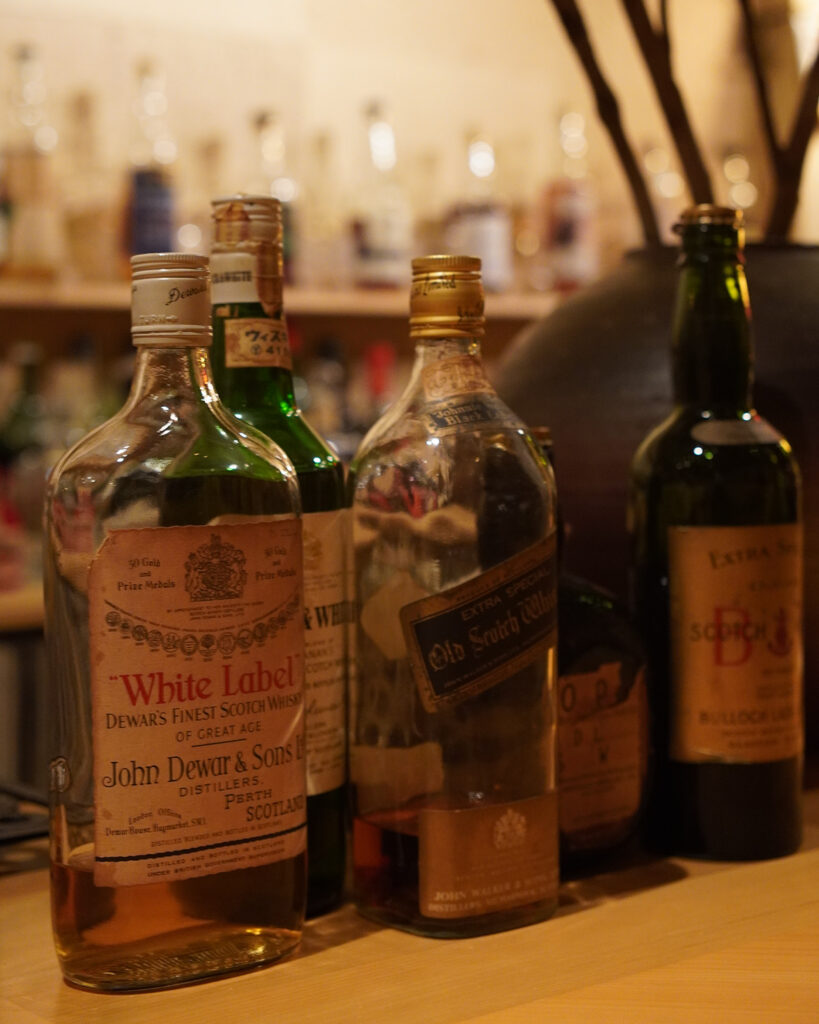
Some of the rare selections, their peeling and tattered labels hinting at their age and adding to their charm.
A Sense of Comfort and Distance
Books from Shuhei’s personal collection add another layer of charm, spanning genres like literary fiction, cocktail guides, music, and subculture topics. “I love the idea of reading while enjoying a drink, so I brought in books that I think customers might enjoy too. That’s also why the lighting isn’t too dim—to create an environment where people can comfortably read.” The books not only enrich the space with homeliness, but also spark conversations, allowing customers to connect with the bar on a more personal level.
The bar’s name, ahiru-sha, was also inspired by a fictional café from one of Shuhei’s favorite books, a novel by singer-songwriter Kenji Ozawa. That café emphasized personal space and the perfect balance of distance between people, an idea that shaped the bar. The design features a lowered bartending area and a wide counter with comfortable seating where customers can enjoy their own space. This philosophy extends to Shuhei’s service, which is welcoming yet understated. While crafting drinks and engaging in conversation, he maintains a calm, composed presence that compliments the ambiance, ensuring visitors feel at ease. “Some customers listen to records, read books, and slowly enjoy their drinks. Others come in pairs and talk. Everyone should be able to enjoy themselves in their own way,” he says, expressing his perspective. For this, a great deal of consideration is put into every detail from lighting to layout, sound, and service. Additionally, BAR ahiru-sha only accepts groups of up to 3 people max to maintain the ambiance and ensure comfort for all.
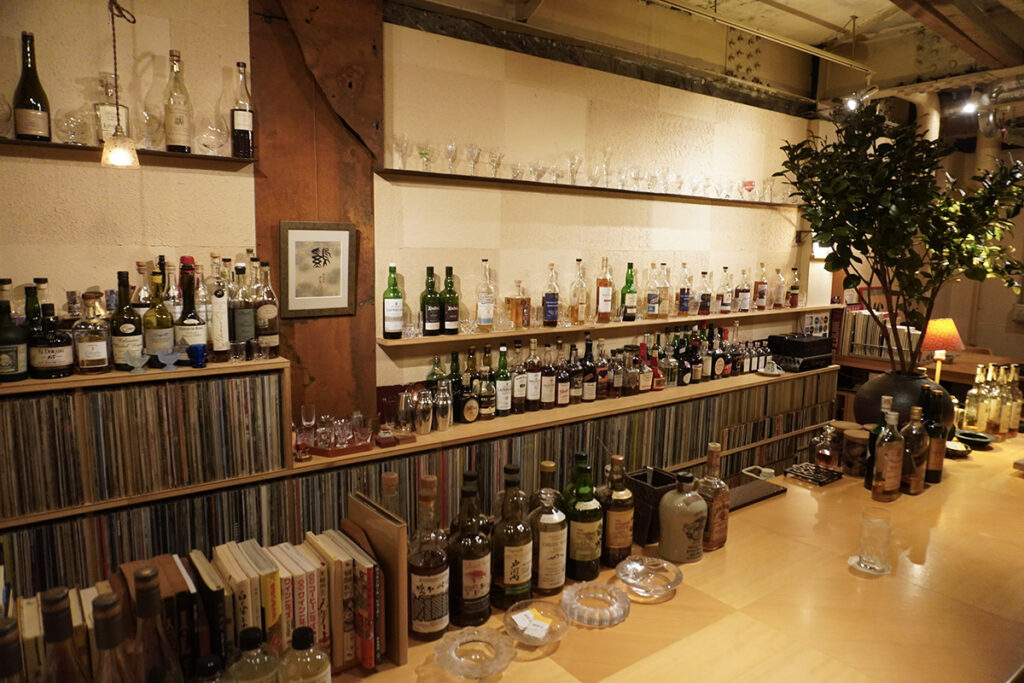
The large counter creates ample space and a comfortable distance while the sunken bar area keeps Shuhei at eye level with seated customers.
What’s truly special about BAR ahiru-sha is how it reflects who Shuhei is and what he loves. More than just a place to drink, it’s a space where passions come alive, and stories are shared through music and craft. Customers are invited to slow down while enjoying the classic and the eclectic. “The bar is a reflection of who I am and what I love. From the records to the books, the decorations, and even the lighting, everything connects to my personal tastes. I think that’s what makes it unique.” This thoughtful approach has resulted in a true gem for music lovers, cocktail enthusiasts or anyone looking for a tranquil hideaway.
BAR ahiru-sha
Kagurazaka5-2F, 5-26 Kagurazaka, Shinjuku, Tokyo, 162-0825
[ MON-FRI ] 17:00~27:00
[ SAT ] 15:00~23:00
CLOSE : SUN & HOLIDAY
*Please note, in consideration of limited seating and the atmosphere, groups of more than 3 cannot be accommodated.
https://www.ahiru-sha.com/

